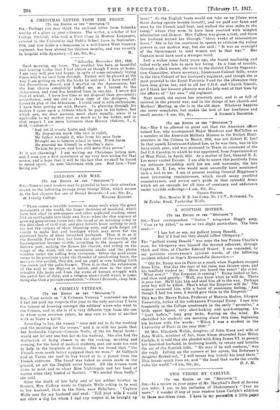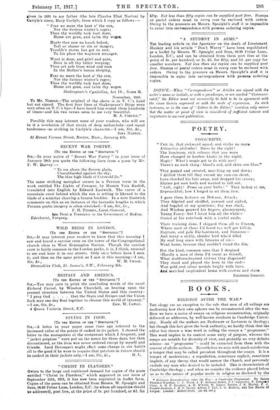TWO VERSES BY CARLYLE.
[To THZ EDITOR OF THE " SPECTATOR."] Sia,—In a review in your paper of Mr. Macphail's Book of Sorrow you refer, I see, to his inclusion of. Shakespeare's " Fear no more." I wonder if any of your readers know Carlyle's addition to those matchless lines. I have in my posseNdOli I little paper given in 1881 to my father (the late Charles Eliot Norton) by Carlyle's niece, Mary Carlyle, from which I copy as follows:—
"Fear no more the heat o' the sun, Nor the furious winter's rages; Thou thy worldly task bast done, Home art gone, and ta'en thy wages.
Hurts thee now no harsh behest.
Toil or shame or sin or danger; Trouble's storm has got to rest, To his place the wayworn stranger.
Want is done, and grief and pain, Done is all thy bitter weeping; Thou art safe from wind and rain In the Mother's bosom sleeping.
Fear no more the heat o' the sun, Nor the furious winter's rages; Thou thy worldly task Last done, Home art gone, and ta'en thy wages.
Shakespeare's Cymbeline, Act IV., Scene II.
November, 1848.
To Mr. Noaros.—The original of the above is in '1'. C.'s hand but not -signed. The first four lines of Shakespeare's Dirge were very often on T. C.'s lips—I have heard him repeat them hundreds of times—and his two verses seem to me very beautiful.
M. A. CARLYLE."
Possibly this may interest some of your readers, who will see in it a revelation of that strain of deep melancholy—and equal tenderness•—so striking in Carlyle's character.—I am, Sir, &c.,
SARA NORTON.
83 Mount Vernon Street, Boston, Mass., January 8111.



































 Previous page
Previous page